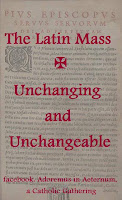- First, there are Traditional Catholics (sometimes called Conservative Catholics). This group tends to accept all (or most of) the creeds (dogmas) of the (Roman) Catholic Church and stress obedience to the Magisterium (the teaching office of the Catholic Church), including the Pope. They tend to accept the changes brought about by Vatican II (though I have found they often do not understand - or might not have read - all of the Vatican II documents - or understand the full implications, scope and sweep of all the documents it generated).
- Second, there are Liberal Catholics (sometimes called Progressive Catholics). This
group tends to disagree with one or more of the creeds (dogmas or teachings) of the (Roman) Catholic Church, and thus tend to challenge, or at least question, the authority of the Magisterium (including the Pope). They tend to relish in the Vatican II documents - though at times they loosely refer to the spirit of Vatican II - which can at times mean whatever they want to promote instead of what was written at Vatican II. (A small minority within this classification go as far as to promote what they call Liberation Theology, which means they promote Marxist revolution as Catholic theology.)Hans Kung - 2009 - Third, there are Ultra-Traditionalist Catholics. They tend to be critical of Vatican II reforms and tend to defend what they consider "old-time Catholicism," or what they affirm as "classical Catholicism." They may prefer the mass in Latin (though not always). They tend to see Catholicism at war with other branches of Christianity - and tend to not like the term ecumenism (though emphasized in Vatican II) or see it solely in terms of evangelization to bring other Christians into the Catholic Church (or to return home as they call it).
- Fourth, there are Charismatic or Evangelical Catholics. They tend to emphasize the work of the Holy Spirit, identify with other Charismatic Christians or Evangelical Christians, personal salvation, a personal relationship with Jesus and salvation based on this. Sometimes they emphasize the baptism in the Holy Spirit, or at least a renewal (or awakening) in faith. (Cursillo is considered part of the renewal movement within Catholicism.)
- Fifth, there are New Age Catholics, or those who might identify with Eastern religions. While some might want to lump these Catholics in with Liberal Catholics (and while there can be similarities), there is a fundamental difference. Liberal Catholics tend to rely on reason - while New Age Catholics tend to distrust reason in favor of mysticism or intuition.
- Sixth, there are what might be called Cultural Catholics. They tend to be Catholic because it is part of their culture and it's expected of them, but it may not have much meaning beyond that - though they tend to feel deeply loyal to the Catholic Church. They may or may not have concerns about spiritual matters. They may or may not understand Catholic teachings, or ethics. If they attend Mass regularly, it is out of obligation to the family or culture. They usually do not think in terms of having a personal relationship with Jesus Christ, though some do.
- Seventh, there are what might be called Folk (or Popular Folk) Catholics. They tend to blend other religious beliefs with their Catholic beliefs (which tends to reflect a sort of Catholicism often found during the Middle Ages). So in some parts of the world, they might combine voodoo beliefs with Catholic beliefs. They may tend to go against true Catholic teaching and may cross over into worshiping Mary as a type of goddess. They may tend to consider the Saints to be a sort of ancient set of semi-gods & goddesses to pray and worship directly to for direct benefits instead of prayer partners to help them bring their prayers before the throne of God.
My point here is not to uphold or dismiss any of theses different types of Catholics (or Catholicism), but instead to point out they do exist, so that it is at times difficult to identify what Catholics actually believe, in contrast to what the Roman Catholic Church actually teaches.
Back to Part 5
Back to Intro
Back to Part 5
Back to Intro







No comments:
Post a Comment